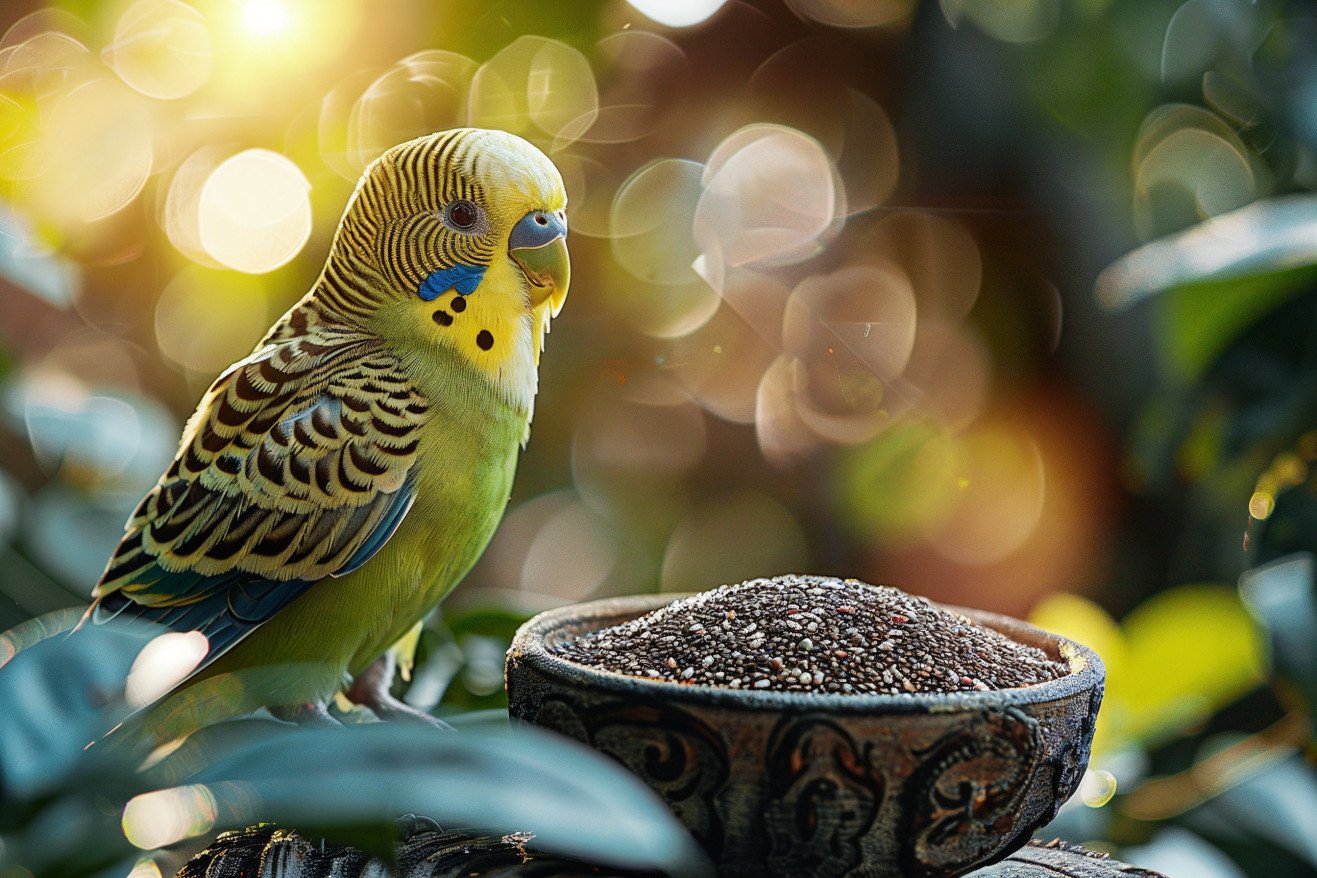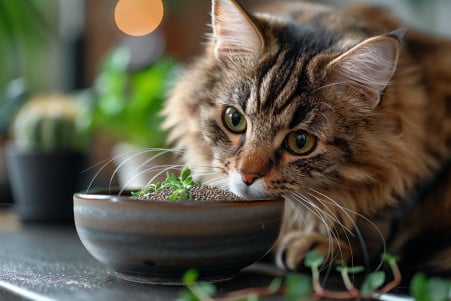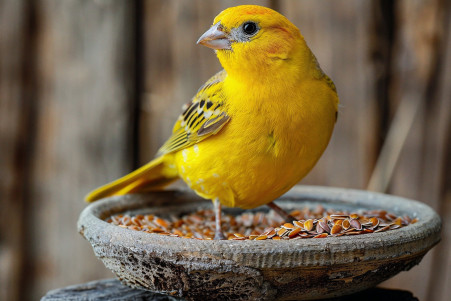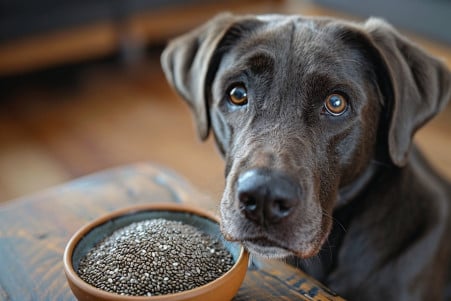Can You Give Birds Chia Seeds? Nutritional Facts and Tips
14 March 2024 • Updated 14 March 2024

Bird lovers may wonder if chia seeds can be added to the long list of things that birds can eat. The answer is yes, birds can eat chia seeds. Chia seeds are a healthy option for birds, providing them with protein, omega-3 fatty acids, and fiber. That said, they should be given to birds in moderation and as part of a well-rounded diet, not as the only food option.
This article takes a deep dive into the world of bird nutrition, drawing on multiple studies from avian health experts and nutritionists to provide a comprehensive look at the pros and cons of adding chia seeds to a bird’s diet.
Through the most up-to-date research in zoology and comparative nutrition, we will explore where seeds fall in a bird’s nutritional requirements and the best ways to offer them. By the end of this article, you will have the information you need to responsibly supplement your birds’ diets.
Can you give birds chia seeds?
Chia Seeds’ Nutritional Benefits for Birds
Chia seeds are more than a fad in the world of human nutrition, and they also bring a lot of nutritional value to birds. Their omega-3 fatty acid content, especially alpha-linolenic acid (ALA), protein, and fiber are particularly noteworthy.
According to the Harvard T.H. Chan School of Public Health, chia seeds are the single best plant source of omega-3 fatty acids and they contain all nine essential amino acids, making them a complete protein. These nutrients are important for birds’ feather growth, energy levels, and digestive health.
In particular, chia seeds’ fiber and omega-3 content set them apart from other seeds that birds eat, like sunflower or millet seeds. According to Birdsmaven, the calcium in chia seeds is especially helpful for nesting birds and fledglings, and the protein helps ensure the strong feather growth that makes flight possible.
That said, the way birds digest and use nutrients is different from humans. For example, a study in Poultry Science found that birds are better than humans at converting ALA into the fatty acids their bodies need. While chia seeds can be a helpful addition to a bird’s diet, it’s important that they are part of a diet that meets the bird’s specific nutritional needs.
Birds That Eat Chia Seeds
Studies have shown that chia seeds are a popular food source for a variety of bird species, including migratory birds and those that live year-round in the areas where chia is indigenous.
According to Wild Bird Scoop, some of the birds that eat chia seeds in the wild and at bird feeders include blackbirds, blue jays, doves, finches, and sparrows.
Some birds may be more likely to benefit from the protein and omega-3 fatty acids in chia seeds because of their high metabolisms and specific nutritional requirements. However, there is no evidence that any species of bird should not eat chia seeds, although their high fiber content means they should be eaten in moderation.
While birds have different levels of adaptability to new food sources like chia seeds, they are generally adaptable eaters. Birds Zone says that offering soaked chia seeds can help attract a wider variety of birds and make it easier for them to digest the seeds.
Spark Lark notes that chia seeds are also a popular food source for domesticated birds like parrots and canaries when they are part of a varied diet. It’s important to introduce chia seeds into a bird’s diet slowly and watch for any signs of change to ensure a healthy dietary adjustment.
How Birds Digest Chia Seeds
When thinking about feeding chia seeds to your bird, it’s important to consider the seeds’ small size and unique texture, both of which can affect how easily they can be digested.
As described in a study published in PubMed by Erik Kleyheeg, the digestive system of birds, especially waterbirds, is highly specialized and alters the physical properties of the seeds they eat.
This makes the size and texture of the seeds they eat important, as larger seeds or seeds with harder coatings may be more resistant to digestion, while smaller, softer seeds like chia may be more easily digested by a bird’s digestive system.
In terms of preparing chia seeds for consumption, soaking them is helpful because it not only makes them easier to digest by softening them, but it may also increase their germinability, a conclusion that’s supported by research on seed germination following bird digestion by Salazar-Rivera. Soaking the seeds may also help mimic the positive effects of digestion, ensuring the seeds have the right consistency to be safely consumed by birds without causing digestive issues.
As with any new food, including chia seeds, it’s important to introduce them into your bird’s diet slowly to ensure they can adjust to the new food and to monitor for any signs of digestive upset.
Without proper preparation, such as soaking, chia seeds could cause digestive blockages or interfere with nutrient absorption. To ensure that chia seeds are safely added to your bird’s diet, start by adding small amounts to your bird’s regular food and watch for any signs of digestive upset, adjusting the amount you feed as needed to ensure your pet stays healthy and happy.
Things to Keep in Mind About Feeding Birds Chia Seeds
While chia seeds are safe and nutritious for birds, there are some things to keep in mind, especially if you’re not feeding them properly. For example, overfeeding birds chia seeds can lead to digestive problems, obesity, and potential nutrient imbalances.
Birds can become overweight from the high fat content in chia seeds if they eat too many of them, even though there are benefits to feeding them in moderation, according to PetzReview.
It’s also important to make sure you’re feeding your birds high-quality seeds; you should only give them organic, contaminant-free chia seeds to make sure they aren’t exposed to any harmful substances or toxins.
Another potential issue is that chia seeds expand when they come into contact with water, which can lead to digestive obstructions in birds if the seeds aren’t prepared properly. PetzReview notes that it’s important to soak chia seeds before you give them to birds to make sure they don’t cause digestive obstructions.
If you notice changes in your bird’s droppings, a loss of appetite, or a lack of energy, these could be signs that your bird is having a negative reaction to chia seeds.
If you think your bird is reacting negatively to chia seeds, you should stop giving them to your bird and contact an avian vet. A vet can give you personalized advice that will help you make sure your bird stays healthy and safe, according to PetzReview.
By keeping an eye on your bird and taking action if you notice any signs of distress, you can make sure that your birds don’t experience any of the potential downsides of eating chia seeds.
How to Feed Your Bird Chia Seeds: A Step-by-Step Guide
When adding chia seeds to your bird’s diet, it’s important to do so carefully. To avoid any digestive issues, Kaytee suggests a slow introduction. This means starting with a small amount of chia seeds mixed in with their regular food and gradually increasing the amount of chia seeds over a few weeks. This will help your bird get used to the new food without causing stress or leading to them rejecting it.
To keep things interesting, mix up the way you serve chia seeds. You can sprinkle them on your bird’s favorite fruits, mix them into ‘birdie bread’, or, as Northern Parrots recommends, put them in foraging toys to encourage natural behaviors. You can also make suet cakes with chia seeds, which will give your bird a fun and stimulating way to enjoy this healthy seed.
It’s also important to watch how your bird responds to new foods. Pay attention to their eating habits, droppings, and overall behavior. If you notice any negative changes, this could be a sign that the new food isn’t working for your bird, and you should consult an avian vet for guidance.
As Avian Behavior International points out, it’s important to be patient. Birds can take a while to get used to new foods, but if you stick with it, they will often eventually come around. By following these guidelines, you can make sure you’re adding the healthy properties of chia seeds to your bird’s diet in a way that’s healthy and comfortable for them.
Chia Seeds: A Superfood for Your Fine-Feathered Friends
Chia seeds can provide birds with essential nutrients like omega-3 fatty acids, protein, and fiber that are necessary for healthy feathers and overall wellness. That said, it’s important to note that chia seeds should be part of a balanced and varied diet, not a replacement for one.
Like with most things, the key is moderation. Overconsumption of chia seeds can lead to health problems like obesity and nutritional imbalances, and they can also cause digestive issues if not prepared properly. Make sure to introduce chia seeds slowly, watch for changes in your bird’s health, and make sure the seeds you buy are organic and free from toxins.
Being a responsible bird owner when it comes to feeding your pet is about more than just giving them food; it’s about knowing what your bird needs and wants when it comes to their diet. If you want to make sure you’re doing everything you can to keep your bird healthy through their diet, it’s important to keep learning and seek out expert advice.
By thoughtfully adding chia seeds to their diets, we can help ensure our birds are healthy and happy and that they live their best lives in our care.


